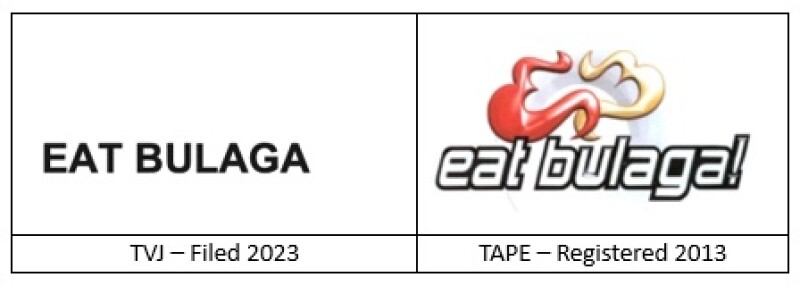Who has the better right to a trademark? The talent who created the mark or the TV producer that registered the mark? This was the bone of contention between TV personalities Tito Sotto, Vic Sotto, and Joey de Leon, also known as TVJ, and Television and Production Exponent (TAPE), the producer of the popular TV variety show Eat Bulaga!, which has been airing in the Philippines for the past 40 years. The competing marks are shown below.

On June 2 2023, TVJ filed a petition to cancel TAPE’s trademark ‘Eat Bulaga!’ and ‘EB’ registrations before the Bureau of Legal Affairs (BLA) of the Intellectual Property Office of the Philippines, docketed as Case No. C/2023/228.
The dispute has been reported as arising from moves by TAPE’s new management to force into retirement a top executive, rebrand, change the host, and reduce the salaries of the production team. TVJ left TAPE and moved to another channel, then the battle over the ownership of ‘Eat Bulaga!’ began.
Arguments of the parties
Joey de Leon alleged that it was he who came up with the name “Eat Bulaga!” and suggested it to TAPE. Hence, the petition for cancellation was filed on the ground that TAPE obtained the ‘Eat Bulaga!’ mark fraudulently.
The records of the case showed the following testimony from Joey de Leon, unrefuted by TAPE: “I remember vividly that I came up with the word mark ‘Eat Bulaga!’ in Tito’s kitchen. I combined elements of the child’s game ‘it bulaga’ with what one would usually do during lunch – eat. Since the show will be aired during lunchtime, I used the word ‘eat’ instead of ‘it’. I added the word ‘bulaga’ because we intended to fill the show with surprises. This word mark was then used, and is still being used, as a title of a noontime show…
“Tito and Vic can attest that I coined the word mark ‘Eat Bulaga!’ because we were all at Tito’s kitchen in White Plains [in Quezon City, the Philippines] at that time. This was featured in the ‘About’ page of Eat Bulaga’s official website, and was also narrated in the article I wrote entitled ‘Eat At Thirty’, published on 21 September 2008 in my entertainment column with The Philippine Star, ‘Me, Starzan’.”
In its defence, TAPE alleged that:
When TVJ agreed to be hired as hosts of the noontime show that it was developing, and pondering the possible names for said TV show, TVJ suggested the name “Eat Bulaga!”, which was chosen;
TVJ and TAPE – and its predecessor, PSI – had worked on the same show for more than four decades, with TAPE openly and continuously using the mark with no objections from TVJ;
It was the first to file and register the mark; and
TAPE’s registration of the trademark ‘Eat Bulaga!’ was only a natural result of its exercise of ownership; hence, there is no bad faith on its part.
The decision of the Bureau of Legal Affairs
In her decision, the BLA adjudication officer (AO) stated that the trademark registration issued to TAPE constitutes prima facie evidence that may be overturned by controverting evidence from TVJ, who had the burden of proof, by submitting substantial evidence that TAPE’s registration is invalid. But before evaluating the evidence presented by the parties, the AO made a determination of the similarity or dissimilarity of the two marks, and found the marks as obviously similar.
Ruling in favour of TVJ, the AO stated that it is not the application or the registration that confers ownership of a mark, but the ownership of the mark that confers the right to registration. The registration system is not to be used in committing or perpetrating an unjust and unfair claim. The Supreme Court emphasised the first-to-file rule in an earlier case, but stressed that “bad faith application is an exception to the IP Code’s first-to-file registration system, that is, one can have a registration in bad faith only if he applied for the registration of the mark despite knowing that someone else has created [emphasis added], used, or registered that mark”.
Based on the submissions of the parties, TAPE admitted that it was Joey de Leon who suggested the name “Eat Bulaga!”, but that it was TAPE chief Romeo Jalosjos Sr. who chose it from among the list of names recommended for the show. The AO, however, found that TAPE failed to sufficiently explain its claim of ownership of the “Eat Bulaga!” name. Having sufficiently established by evidence that TVJ coined the words “Eat Bulaga!”, the AO ruled that it is TVJ who own the mark, and granted the petition for cancellation in a decision dated December 4 2023.
The case is on appeal by TAPE.
Aftermath of the decision
In another case, for copyright infringement and unfair competition, the Regional Trial Court of Marikina Branch 273 on January 5 2024 issued a permanent injunction to prevent TAPE from using “Eat Bulaga!” on GMA Network, with the decision on appeal. At this time, TVJ uses the ‘Eat Bulaga!’ mark for its noontime show on TV5, while TAPE, complying with the injunction, dropped the ‘Eat Bulaga!’ mark and uses Tahanang Pinakamasaya! for its noontime show on GMA Network. The saga continues.











